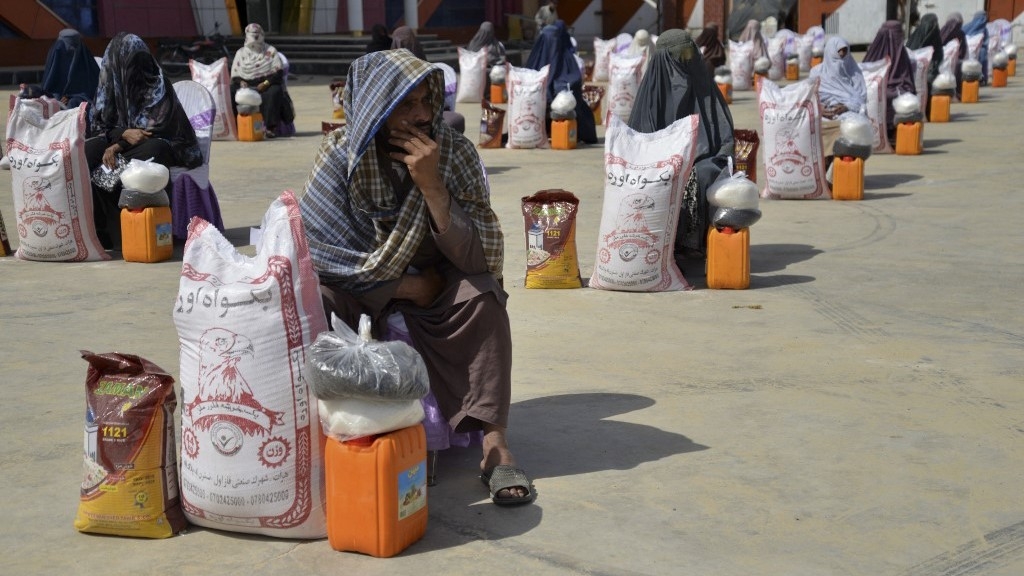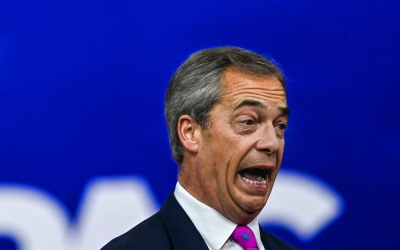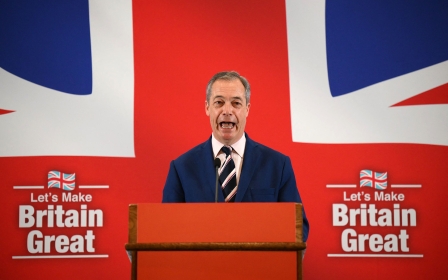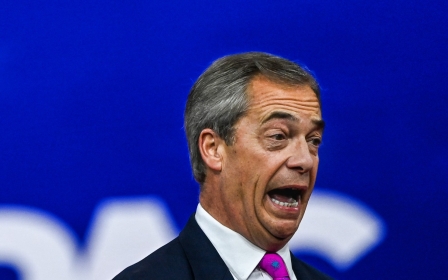Nigel Farage: UK Muslim charities criticise lack of interest in their bank account closures

Muslim faith-based charities in the UK are calling out the double standard when it comes to their bank accounts being closed, in the wake of the ongoing media furore over the closure of Nigel Farage's Coutts bank account.
Earlier this month, the closure of the former UK Independence Party leader's bank account was widely covered in the media, with the high net-worth private bank Coutts apologising to the Brexit campaigner for closing his account over his views that the bank said did not "align" with its values.
On Monday the BBC and its business correspondent Simon Jack also apologised to Farage after reporting that his account was closed for financial, not political, reasons, and correcting those reports.
However, key figures in Muslim faith-based charities say that they have long faced bank closures, with no explanation, which in turn hinders their efforts to help impoverished communities, especially those in remote regions.
Due to bank account closures, a number of international and smaller charities based in the UK have faced challenges in fundraising and delivering aid to destitute regions and areas where natural disasters have struck.
Delays and denials
Alun McDonald, head of media at Islamic Relief Worldwide, said that it was common to hear of charities facing delays and denials when using the international banking system to send funds.
“Some banks are reluctant to deal with humanitarian charities working in the world’s most fragile and complex states because it’s simpler to just say no. This often disproportionately affects Muslim faith-based organisations or smaller, local organisations,” he told Middle East Eye.
While Farage received a 40-page report regarding the closure of his Coutts account, many Muslim charities and public figures say they have not received the same explanation for their account closures.
McDonald says that while charities welcome the efforts promised by the UK government to try and improve the situation, there is still a lot of work to be done.
“Rather than closing accounts and ‘de-risking’, working more closely with charities allows banks to mitigate their risks and meet their compliance standards while ensuring that humanitarian aid reaches people who urgently need it,” he says.
He also called on more banks to try to understand the due diligence protocols that charities have in place, so that communities are not left without essential aid.
Deprived of life-saving aid
Fadi Itani, the CEO of the UK-based Muslim Charities Forum, says that charities have been facing bank closures for over two decades and are often "over-policed" by banks and their policies.
“This typically happens with organisations working in more sensitive regions where there is a higher security risk, but we've found this to be extended to a much wider definition, creating an unfair burden for charitable organisations to work with,” he told MEE.
The closure of bank accounts can often hinder a charity’s efforts in providing life-saving aid, which can be particularly disadvantageous to people in regions affected by conflict.
“On one level those that are most in need, such as in regions of Syria, Gaza and Somalia and other parts of the world, would not get immediate aid at all, depriving them of life-saving assistance,” explained Itani.
“It is really only Muslim organisations that are able to provide life-saving aid in these remote regions where there also arises security risks, and unfortunately, those carrying out anti-money laundering checks become overly prudent, not being able to really understand the context of the aid that these organisations provide on the ground."
Pro-Palestine groups targeted
The widespread media coverage of Farage’s bank account closure compared to the minimal coverage of Muslim organisations that have suffered closures has also sparked criticism.
“Muslim organisations do not get as much coverage in the press in which there are the same underlying issues…it seems the public attitude and sympathy to the Muslim cause was just scarce, with no real ongoing mainstream interest or support campaigns, as we see now with Farage,” said Itani.
Pro-Palestine campaigners and activists have also highlighted that they have been subjected to bank closures for years as a result of their political views without a major backlash from politicians or the press.
In 2015, the Palestine Solidarity Campaign - the UK's most prominent pro-Palestinian organisation - had its bank account with the Co-operative Bank closed, with no further explanation cited other than “the bank’s risk appetite".
In 2016, the Friends of Al-Aqsa, another pro-Palestinian organisation, saw its bank account closed by the Co-operative Bank "without explanation".
A number of similar organisations have also faced sudden account closures with little or no notice or explanation.
Middle East Eye propose une couverture et une analyse indépendantes et incomparables du Moyen-Orient, de l’Afrique du Nord et d’autres régions du monde. Pour en savoir plus sur la reprise de ce contenu et les frais qui s’appliquent, veuillez remplir ce formulaire [en anglais]. Pour en savoir plus sur MEE, cliquez ici [en anglais].





